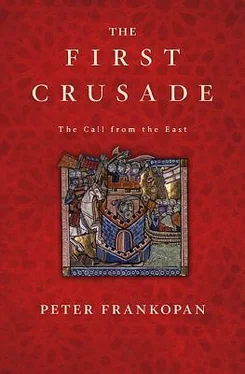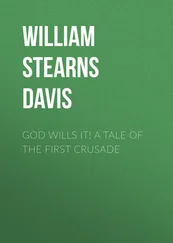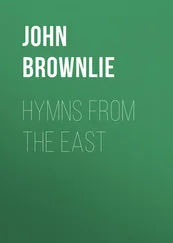The sense of relief in the western camp did not last long. Barely a month later, at the start of 1098, scouts reported that another large relief army, led by Ridwan, the governor of Aleppo, was approaching fast. The principal leaders of the crusading force met in council and decided that some 700 knights would move against the Aleppan force, while the rest of the expedition was to remain at Antioch to maintain the siege as best they could.
Bohemond, Robert of Flanders and Stephen of Blois left camp on 8 February 1098 under the cover of nightfall. 79When they encountered the Aleppan army, Bohemond once more took a leading role in battle. As had been the case with Duqaq’s force, the Turks again threatened to overwhelm the western knights. Bohemond stood firm, urging those close to him: ‘Charge at top speed, like a brave man, and fight valiantly for God and the Holy Sepulchre, for you know in truth that this is no war of the flesh, but of the spirit. So be very brave, and become a champion of Christ. Go in peace and may the Lord be your defence!’ 80
Bohemond’s ferocious determination inspired his men and startled the enemy. But the Crusaders’ battlefield tactics were also important. Part of the western cavalry hid from view, waiting for the right moment to ambush the enemy. They chose their moment impeccably, successfully dispersing the Turks so they could be picked off in smaller groups. As the Crusaders counter-attacked, Ridwan’s army fell apart. Once again, a miraculous victory had been delivered against all the odds.
The stock of the commanders who had overseen the success rose dramatically. Raymond of Toulouse’s ill health had prevented him from taking part and he had been left in command of those who remained at Antioch. Tatikios and the Byzantine force too could not take any credit for the successes over the governors of Damascus and Aleppo. Bohemond, on the other hand, had been inspirational. As one eyewitness reported, ‘Bohemond, protected on all sides by the sign of the Cross, charged the Turkish forces like a lion which has been starving for three or four days which comes out of its cave thirsting for the blood of cattle and falls upon the flocks careless of their own safety, tearing the sheep as they flee hither and thither.’ 81It marked the beginning of a personality cult that was to prove enormously powerful in the years that followed.
The rout of Ridwan’s army was a major boost to morale. Equally, it was a huge shock to the city’s inhabitants who were presented with the sight of Turkish heads on posts in view of the city’s gates. It was a grim reminder of what would happen to them if they continued to hold out. 82
Three times now, in their encounters with Kilidj Arslan, Duqaq and now Ridwan, the Crusaders had come within a hair’s breadth of catastrophe. While they had survived on each occasion, the odds of them succeeding each time an army set out against them diminished. The governors of Nicaea, Damascus and Aleppo might have failed. But there were other local rulers, to say nothing of the mighty sultan of Baghdad and the vizier of Cairo, who were likely to intervene sooner or later. The question was whether the Crusaders could break Antioch before their good fortune ran out.
10
The Struggle for the Soul of the Crusade
Even after repelling Ridwan’s attack, the Crusaders were still highly exposed. And the longer the siege went on, the more vulnerable the western army, depleted by illness and disease, grew. The struggle for Antioch in the first half of 1098 now fuelled dangerous levels of discord within the leadership of the expedition. The careful balance of interests between east and west – Byzantine reconquest and Christian Crusade – was thrown off-kilter by the loss of morale and the competing personal ambitions that emerged outside the walls of Antioch.
In an attempt to break the deadlock, Adhemar of Le Puy urged the knights to fast for three days and march in a solemn procession around the city walls. He decreed that Mass be celebrated and psalms be recited more frequently, and suggested that fortunes might improve if everyone shaved their beards. 1He also thought that too few Crusaders were wearing a cross and insisted that all should attach the symbol to their garments. 2For the bishop there was a clear link between the terrible suffering in the camp and the lack of piety shown by the Crusaders.
As morale was plummeting, desertion became commonplace among the rank and file. The Crusade leadership took an uncompromising line, with severe punishments handed out to anyone found trying to flee. When Peter the Hermit, Walter the Carpenter and William of Grantmesnil were discovered slipping away, they were caught by Tancred and taught a humiliating lesson: Walter was made to lie on the floor of Bohemond’s tent ‘like a piece of rubbish’ before being chastised in front of the rest of the force. 3Those who abandoned the siege were fit for the sewers, wrote one commentator. 4So fragile was morale in the Crusader camp that even the leaders took oaths, promising each other that they, at least, would not leave until Antioch had been taken. 5
These commitments were a way of binding together the most senior figures, some of whom were now developing misgivings about the siege. Bohemond, for instance, had threatened to leave early on in the blockade, complaining not only about the loss of life amongst his men, but also protesting that he was not wealthy enough to provide for his force as food prices rocketed. 6Others were less direct. Stephen of Blois retired to Tarsos, ostensibly to regain his health – a euphemism for not having the stomach to endure the suffering at Antioch. 7Robert of Normandy too felt he would rather view proceedings from comfortable surroundings, and had withdrawn to a more hospitable location on the south coast of Asia Minor by Christmas 1097. 8Although it took repeated attempts to encourage him back to the siege, at least he did not leave for home. One contemporary chronicler was surprised that Robert did not give up and return to Normandy, given his weakness of will, his prodigality when it came to money, his love of food, and general indolence and lechery. 9
The burning question was how to provision the Crusader army. The nearby city of Tarsos had been retaken by forces loyal to Byzantium in 1097; so too had Laodikeia, the last remaining Turkishheld port on the southern coast. Alexios now established Laodikeia as the primary supply base for Antioch, the hub for ‘wine, grain and great numbers of cattle’ being sent from Cyprus. 10Operations were overseen by the island’s governor, Eumathios Philokales, who also took charge of Laodikeia by the spring of 1098. 11
Yet although the threat of pirate raiding had all but disappeared, Cyprus was not able to supply resources in great enough quantities to keep thousands of men and horses nourished through the lean winter months. There were two solutions to the dilemma: either to improve supply lines dramatically or increase the number of men at Antioch so the city could be properly cordoned off and the siege brought to an end. As Bruno of Lucca put it when relaying news of the situation in the east to the inhabitants of his hometown, Antioch had been surrounded by the Crusaders, ‘but not very well’. 12
It fell to Tatikios to take the initiative. The Byzantine commander had been responsible for quartermastering the Crusader army and ensuring smooth progress to Antioch. At the end of January 1098, he left the Crusade, promising to send ‘many ships laden with corn, barley, wine, meat, flour and all sorts of required provisions’. Yet although he left his possessions in the camp, he did not return. 13
Tatikios’ departure became notorious, and was used later to show that he – and therefore the emperor Alexios – betrayed the Crusaders, abandoning them to their fate at Antioch. He set off, said one chronicler, ‘in false faith ... to carry a message about the promised relief, which he had not done faithfully at all, since he did not return to Antioch again’. 14In the words of Raymond of Aguilers, who was present during the siege, Tatikios left ‘with God’s curse; by this dastardly act [of not returning], he brought eternal shame to himself and his men’. 15‘He is a liar’, was the verdict of the author of the Gesta Francorum , ‘and always will be.’ 16
Читать дальше











